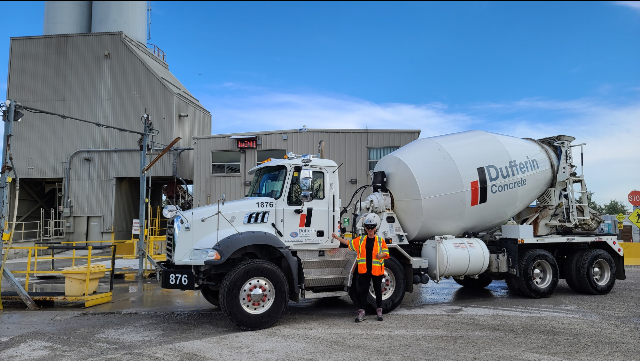A Better Living, a Better Life
Editor’s Note: This article was originally published by Concrete Ontario as part of their initiative to highlight and support women in trucking. It has been edited for length and republished here with permission. Concrete Ontario is an association that represents approximately 96% of all ready-mixed production and manufacturing in Ontario.
“Here I was, a single mom… working as a waitress. [It was the] end of a very long work day with little to show for it. [I was] cleaning up the bar with another colleague and it just slipped out: ‘I need to make a better living for my kids. I need to make a better living for me. Maybe I need to be a truck driver.’ My colleague actually laughed and responded there was no way I could get my trucking license. What that colleague didn’t realize was that I come from a big family of strong, determined women. When we’re challenged, we step up and prove people wrong.”
This determined woman is Melissa De Carvalho, an AZ DZ licensed concrete delivery professional with Dufferin Concrete (Note: AZ DZ drivers hold licenses in two Canadian vehicle classes, permitting them to drive DZ straight trucks exceeding 24,000lbs, including a towed trailer not exceeding 10,000lbs, and heavier AZ trucks with their trailers weighing more than 10,000lbs.)
With the last eight years of her driving career spent in Ready-Mix, the work-life balance has been good. Summers are quite busy and come with “really great money,” says the mom of two daughters, 12 and 14. And then in the winter, the schedule eases a bit and she enjoys balanced time with her family.
“When something happens, Dufferin has always been very flexible and accommodating when it comes to unexpected mom stuff,” Melissa says. “Being a single mom, it makes all the difference knowing that my employer understands that things happen. If there’s an emergency and I have to be there for one of my kids, they support me to do so.”
At this point, for Melissa, the biggest challenge is washrooms. She says people don’t expect her to say that and might not see what “the big deal is.” “But it’s something we have to talk about and the whole construction industry needs to think through,” she emphasizes. “At my home plant, there is a women’s washroom that women plant team members use and that is great. If you want women drivers, batchers, and dispatchers to feel welcome at your plant, there’s no way around this.”
On construction sites, this is still an issue. Though there are now women-dedicated portable restrooms on most sites, they are always locked.
“You can understand why,” she says. “But the issue is what it takes to get the door unlocked. It’s just awkward. [You] have to bother your client, and then they have to radio someone and get the supervisor there with the key. I’m not sure what the solution is. Maybe a key code that changes every day so the key code can just be shared over the radios rather than someone physically having to deliver a key.”
The growth and support of zero-harassment policies are also very important. “Companies all throughout construction are doing so much more to make sure everyone is aware of and follows them,” says Melissa. “It lets all kinds of people know they belong. And lets people know they can professionally and respectfully tell people “It’s not ok for you to say that” and know that you will have support. There are so many more men supporting women than not.”
About the Author: Andrea Boddy, owner and chief consultant for Andrea Boddy Consulting, offers marketing, strategy, business advising, sales, training, and coaching services to concrete construction and related industries. Once a fairly lone "shewolf" in the Ontario concrete industry in the early 2000s, Andrea is passionate about supporting women and others to discover and succeed in rewarding concrete careers. She is a past board member of ACI Ontario and Concrete Ontario, and has a Masters of Applied Science from University of Toronto and an Executive MBA from Queen’s University.


